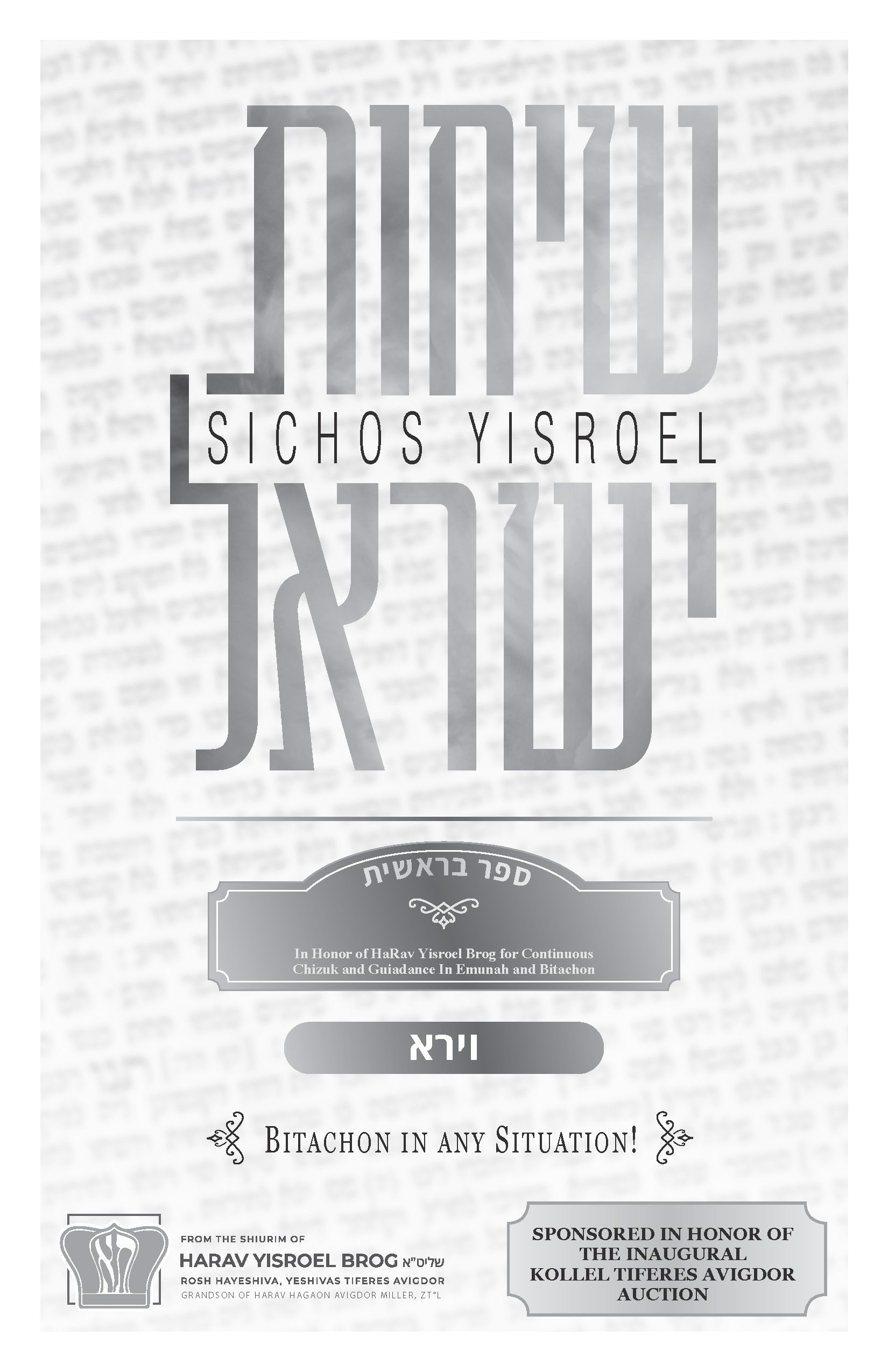Vayeira 5784: Bitachon in any Situation!
Sponsored
In Honor of the Inaugural Kollel Tiferes Avigdor Auction
Consider sponsoring a shiur
Visit YTATorah.org
Shiur presented in 5779
Parshas Vayeira: Bitachon in any Situation! (5779)
The Real Source of Simchah at a Chasunah
Baruch Hashem yesterday we enjoyed a Yiddishe chasunah.[i]For every chasunah, Hashem yisbarach has to go out of His way and be mashpia a shefa of simchah. Most chasunos come along with a simchah package, and the simchah package is not to be taken for granted. It’s Hakadosh Baruch Hu granting the families, the couple, a dose of simchah. Simchah is a brachah from Hashem. Hashem in His kindliness sometimes gives a dose of simchah even though Hashem, Himself, is unhappy. That’s part of Hashem’s amazing patience and His amazing tolerance; He grants simchah even when somebody is making a chasunah that doesn’t look to Hashem or to a discerning eye like a Yiddishe chasunah. Chazal in halachah talk about a Yiddishe chasunah. There’s a concept that if the chasunah lacks certain ingredients, you don’t say shehasimchah bimono, that Hashem is rejoicing in His place upstairs. You could have a simchah down here, but it’s not necessarily something that Hashem is joining in, even though Hashem is granting this couple or family joyous moments.
Now, you have to realize that joyous moments are not just for the moment. Chazal tell us that any mitzvah that’s done with joy has a tremendous benefit. You know what that benefit is? The gemara says that any mitzvah that Klal Yisrael did with simchah throughout the millennia, when Klal Yisrael was challenged, the simchah kept that mitzvah going. And any mitzvah that wasn’t accepted besimchah, over time, that mitzvah became diminished and lost. One of the examples is bris milah. Bris milah is not logically something that should evoke simchah. Maybe the meat that evokes simchah. Maybe if it’s a fleishige bris, a nice one, that evokes simchah. Maybe some people like eating cold lunch meat at breakfast or whatever it is. But the gemara says that the bris itself was actually accepted with great simchah. That’s why you find throughout history people still do it.
You have to know when somebody gets married, if it’s a Yiddishe simchah that simchah is going to carry them for many years. It’s not just for the chasunah itself. The more Toradik and the more things are done according to the will of Hashem, that’s what is going to bring future joy and future simchah. When chasunos end up nebach in the garbage heap, when they end up dissolving, and thre is no endurance to the chasunah, it is because there was a lack of simchah. Ai, they were so happy. Look at the pictures. They put on these big fake smiles. The photographer was screaming, “Chocolate bananas!” and all the adults put on these big smiles. But it was a superficial simchah. When I say a Yiddishe simchah it means a simchah that Hashem was rejoicing with.
I was at many simchos in my life where there was no joy at the chasunah. I was at a chasunah when all of a sudden the lights went out – while everybody was sitting in the chuppah room waiting for the chosson and kallah. Everybody started saying, “The lights, the lights.” It happens that a guy bumps against the lights or there’s a timer, but it turned out that the owner of the chasunah hall was the one who shut the lights. Then he called the police. When the people found him, he said, “I’m not turning the lights on.” It turned out that one of the sides refused to pay. I said, “Oh no.” They asked me if I could help out. I said, “I’m not sure, but I’m going try.” I was the officiating rabbi at the time. I went to talk to the two sides. The side that was responsible for paying backed out because he looked at the table – which was full of food, dips, and all kinds of things – he noticed that one of the dips was missing. So he decided that he wasn’t paying for the wedding. The other side paid his due. I got to the family rav. I said, “I can’t talk to these people. Why don’t you try?” He went in there, and he came out saying, “There’s nobody home to talk to.” That chasunah had little joy.
I know of another chasunah, where the band literally surrounded the car – they linked their hands around the car of the chosson and kallah when they were trying to leave the hall – and refused to let them pass because the band wasn’t paid after a wedding. Imagine that when the couple is trying to leave, everybody makes a “kumzitz” around their car holding hands and they’re not letting them get out! And the police were called!
Then you have chasunos that are ta’aruvos. You see not tzniusdige things at weddings. It’s extremely unpleasant for Hashem. The reiach that comes out from such affairs is not what you call a reiach hanichoach that’s leratzon lefnei Hashem.
Avraham Avinu Hopes for Hachnasas Orchim
These parshiyos of the Torah teach us the foundation of our lives. A foundation is something upon which other things are built. If you have a small foundation, you can build a small binyan. If you have a large foundation, you can build a large binyan. The foundation upon which kiyum hamitzvos, fulfillment of mitzvos is dependent, is bitachon. Bitachon is the foundation upon which a life of עבדו את ה’ בשמחה is founded. Without bitachon, a person doesn’t feel secure. A person doesn’t feel he has whom to rely on. He is plagued by doubts, by worries, and concerns that don’t allow him to commit himself to Torah and mitzvos because he’s afraid that if he does it might detract from his life. Bitachon is the name of the game.
Our parshah begins with some tidbits in bitachon. It starts off with Avraham Avinu not being able to fulfill the mitzvah of hachnasas orchim. Avraham Avinu was desperate to do the mitzvah of hachnasas orchim. Now, how did he go about it? Does it say he davened and he prayed for Hashem to send him guests? No. You know what it says he did? He sat down by his door. He wobbled to his door, sat down by the doorway, and decided to wait. Now, I could tell you, if it would be hotter than hot outside, and you couldn’t find a living soul walking in the street, and you would see somebody waiting by the door, you would say to him, “What are you waiting for?” Let’s say he tells you, “I’m waiting for guests.” Not believing what you are hearing, you would reply to him, “It’s not humanly shayach to go out today. What are you waiting for?! You don’t have a chiyuv to do this. Hashem didn’t tell you that He’s sending you guests.” You know what the answer is? ‘קוה אל ה. It says you should hope to Hashem. Hashem says, “Hope to Me.” Avraham Avinu is hoping to Hashem.
A short while later guests appear. His bitachon, his kivuy in Hashem brought about a miracle. Hashem produced guests in an inhuman situation. They happened to be malachim. But they didn’t look like malachim. Hashem gave Avraham Avinu the opportunity to do the mitzvah of hachnasas orchim. We learn a very important lesson from this episode: I don’t care how bleak the situation looks, I don’t care how hopeless and ridiculous it seems to be right now. You hope to Hashem.
Not 100% Trusting in Hashem
Then the parshah goes on and tells us that these folks asked, “Where is Sarah your wife?” והנה באוהל, “behold, she is in the tent” (Bereishis 18:9). They give her a brachah. The brachah was that she should have a child. They heard she had no children, and they gave her a brachah that she should have a child. Sarah laughed. Now, it doesn’t say that Sarah was rolling around her tent in laughter. It doesn’t mean she was hollering out and all the malachim could hear her hollering out, “Hahaha.” You ever see these guys, the laugh they give out, and everybody in the other room screams out, “What’s so funny over there?” Sarah’s laughter was such a very minor laughter that she was pashut able to say, “I didn’t laugh.” You can’t say that if you’re rolling around on the floor LOLing. It doesn’t work like that. What does Hashem say? היפלא מה’ דבר. You have to listen to the rebuke that Hashem gives. היפלא מה’ דבר, “Is anything too wonderous for Hashem?” (v. 14). Is there anything that’s removed from the ability of Hashem to produce? Nothing is impossible for Hashem.
Now, no one said it was probable. No one said that you would expect her to go out and ask Avraham, “Where do we order cribs?” Maybe not that, but to laugh? Laughter means there is a certain sense of it being impossible for this to happen.
Hashem is going to ask us someday, “Did you await the Moshiach?” Now, Hashem is not unreasonable. Chas vechalilah. Do you think Hashem expects us to wait for the Moshiach like a guy awaits his wife’s arrival at home, or his child’s arrival from school? No. But if somebody would tell you, “Heads up! Today Moshiach is coming!” you know what most of us would say? Do you think they would say “Ah, BaruchHashem…”? I think most people would not say that. And you would reply, “I’m telling you, Moshiach is coming today, and I mean it!” I think many people would kind of smirk and say, “Well, let me check.” They’d look outside the window and not see anything out there and say jokingly, “Well, maybe he’s in a different neighborhood right now.” They wouldn’t say, “I really hope so!” because to most of us, it’s preposterous, and that’s why there’s no waiting for Moshiach. Hashem wants us to say, “I really hope that he’s coming today.” It’s going to happen someday. Whether you believe it or not, that’s not going to make a difference. It might make a difference whether you will enjoy the arrival of Moshiach or not, but it’s not going to prevent the arrival of Moshiach. A person has to say to himself, “I am metzapeh for the coming of Moshiach.”
Now, there were tzaddikim who worked on themselves in this area. One of the ways they worked on it was they took a suitcase, and prepared themselves for the arrival of Moshiach, even with bottles of wine. That’s how they made it a reality. Almost forty years ago, I started a wine collection of wines that I didn’t like, but I was told they were very expensive wines. I said, “I’m a very pashut, simple Jew and I don’t have any expertise and appreciation for sour wine,” but I said to myself, “I’m sure Moshiach has got a better palate than I do so maybe he’ll like it.” So, I started putting aside bottles until it got to a sizable amount. Somebody came to me one day, who was a wine expert, and said, “What are all these wine bottles for? These are really good wines.” I told him, “I’m waiting for Moshiach and saving them for that occasion.” He said, “By the time Moshiach gets here these wines won’t be edible because you didn’t store them properly. You’ve got to store wine properly, or it gets ruined.” He said, “There’s a difference if it’s white wine or red wine.” I had all kinds of different hechsheirim. I wasn’t sure which hechsher Moshiach is going to like or not like, or if he’s going to be a Brisker and not drink any wine from the store, and want his own wine and he’ll come with his own bottle and say, “Listen, my friend, you keep your wine for yourself. Ich drink nor heimeshe vine, meine vine.”
Train Ourselves in Seeing Hashem as Totally Unlimited
So, the lesson is that we have to train ourselves. Whatever we may be waiting to get or hoping to avoid, provided we need it for our Avodas Hashem, could happen and there’s nothing to stop it because, because היפלא מה’ דבר. Today, a person can get sick, chas veshalom. People living with chronic pain have an unimaginable challenge. The word chronic means temidi, constant. They go to this doctor. They go to that doctor. They get pain blockers. But they live with the pain. It’s worse, more than worse. And they ask in the hospitals about the pain. When you go to the hospital – you should never have to go there chalila – they put a chart in everybody’s room with different degrees of sad faces. They point to it, and they say, “Look at this chart. On a scale from 1 to 10, what degree of pain do you have?” But a person has to know that there’s no such thing as chronic pain. There’s nothing chronic. היפלא מה’ דבר?! Can’t Hashem change anything?! I said, “Where does it say in Chazal that if a person has a certain pain, he should not hope and pray to the רופא חולי עמו ישראל that it should stop”?
Many frum people are very guilty of this. Chas veshalom, a person breaks his leg. They go to the hospital, and they give a prognosis. I’ll never forget, I once came running into my home, headed down the steps toward the basement where I was residing at the time, and I went flying forward. My legs buckled under me on the steps, and I fell forward. And I saw myself going for the tile at the bottom of the steps. Hashem was with me. I reached out my hands, and I plastered them against the two side walls of the steps, and I broke my fall. I felt my hands become like suction sticks. I was lying there between shamayim va’aretz. I managed to get one foot out, and I sat down on the step. And I noticed that my pants at my knee were being pushed out. Extremely pushed out. I realized that my knee had snapped. The strongest tendon in the body is the one that runs from the top near your hip to your knee and it holds that knee in place, and it had snapped so my knee was protruding. I remember thinking, “Should I scream? Should I not scream?” I remember the chessed of Hashem. Hashem was with me. I closed my eyes, and I went into a אין עוד מלבדו mode like you can’t imagine! Within seconds, I literally managed, with the help of Hakadosh Baruch Hu, to zone out. I felt like I raised myself and elevated myself above the matzav. It was like I was down there and I was in the zone up here. I vaguely remember my wife coming and saying, “Is everything all right?” She called 911. Some big, burly firefighters came, and they said that I was in total shock. I remember the guy saying it. I wanted to tell the guy, “Buddy, you’re in shock more than I’m in shock.” But I didn’t say anything. I just remember they got this cloth on the step underneath me, and they lifted me up off the step and carried me outside onto a stretcher. When I laid down on the stretcher, I couldn’t figure out how my knee wasn’t bent. I didn’t feel like I was bending my knee. It was sticking up. It wasn’t being held down by that tendon.
I remember, I went to the hospital. I stayed in that zone. I remember the doctor came in and said, “We’re taking you to the emergency room.” They took x-rays. They said, “You’re hemorrhaging terribly on the inside.” They came with that famous questionof theirs, “On a scale of one to ten how much pain do you have?” I said, “None. I have no pain.” The doctor said, “No, no. How much pain do you have?” I said, “I have no pain.” The doctor asked me, “Can I touch your knee?” I said, “Go ahead.” He put his hand on my knee and pushed it down. He said, “Does that hurt? I said, “No. It does not hurt.” I remember he called at least another six or seven doctors, maybe even more, from the emergency room to come take a look at this phenomenon. Each one held this thing up to the light to see how the break was. They said it’s not humanly possible. He asked me, “Do you have a very high threshold for pain?” I said, “Absolutely not. I dislike it like everybody else.” I was able to get wheeled out of that little cubicle and be led to a phone because I had to say a shiur that night. I taught it to one of my talmidim over the phone in order for him to be able to give over the shiur that night. They were all watching in amazement in the ER.
Trust in Hashem – More Than Doctors
I believed and I still believe היפלא מה’ דבר. I believe it. Most people say, “Whatever they tell me, that is what’s going to be.” They believe it with all their heart and with all their soul. And if somebody says, “You should have no pain,” they say, “Are you being funny with me?” Hashem metes out pain in the tiniest little measuring cups. Hashem doesn’t have to give a person pain in a typically painful situation. One isn’t mechayev the other. Hashem decides every step of the way.
I remember another time, one of my children got burned. Nebach rachmana litzlan it should never happen to anybody. I watched her entire body, the entire skin of her body peel off in one complete piece. It appeared that she was in a sack made out of flesh. Her skin mamash came off her body, and it was like literally she was in a bag. We rushed her to the hospital. The doctor gave me his news. I remember explaining to this goy that it was not within his domain to determine what a person’s chances are to live or not to live. And when you say that to somebody, it’s not right, because if you tell a person he has a 5% chance to make it, the person gives up hope. I told him, “Don’t get into areas that are not your expertise.” I said, “I’m a young rabbi. That’s my domain. I won’t get into your domain, which is the domain of healing.” He told me that my daughter had a few percent chance of making it through the night with the level of her burns.
My daughter lived through the night. Then he gave me his other chochmos. After Shabbos, he told me: “She’s going to be in the hospital for at least a year. She’s going to have to endure skin grafts all over her body. Probably between forty and fifty surgeries. It’s going to be a very long haul. You’re going to be in the hospital for one year.”
I remember while he was saying that I was thinking to myself, “Yada yada yada yada yada yada.” I remember thinking, “This guy is mamash a tipesh.”I’m thinking, “Hashem, can you teach this guy a lesson?” What right does he have to say that nonsense?
I understand that he has medical experience. But who does he have experience with? People who don’t live on my planet. It’s a different planet! You can’t compare people who live on Mars to people who live on Earth. It’s a different environment there. Different ecosystems. Different lives.
You know what the problem is? Unfortunately, most Yidden believe that goy. Most Yidden think they’re similar to goyim – even though we say every morning: ברוך אתה ה’ אלקנו מלך העולם שלא עשני גוי. I’m something different.
So whatever a doctor tells you, you have to think, “Lav davka. Lav davka. Mei heicha teisi?”A lot of people are cynical and whatever you tell them they always say, “Meiheicha teisi. Who said it’s that way?” This is where you have to use that midda. They try to knock you away from Hashem and undermine you. It’s a challenge. Many people fall into this challenge and become devoured by bad news. That’s not what Hakadosh Baruch Hu wants from a person. Hakadosh Baruch Hu wants you to turn to Him in every single situation and say, היפלא מה’ דבר.
We walked out of that hospital about three and a half weeks later with my daughter. I won’t tell you she was cured, but she was ready to be released from the hospital. Yes, it took a couple of weeks, maybe even a couple of months. We had to change the gauze on her body every single day, and it wasn’t a picnic, to say the least. But my daughter didn’t have to suffer and endure fifty skin grafts and not forty skin grafts and not thirty skin grafts and not twenty. One skin graft the size of a dime on the bottom of her foot, which was all she got!The doctor was in such shock, it was unbelievable. He was telling me, “Why do you always argue? Do you argue with everybody?” I said, “No.” I said, “I argue with people who talk about things they don’t know.” He was very put off by that. He was the head of a very, very exclusive burn unit, trauma unit. Many fly their helicopters over there. But I told him, “You don’t understand something.” I said, “You have no access to, you can’t even fathom what I fathom. You can’t fathom how my mind works, what my reality is, and the dimension in which I exist. I know where you exist. You can’t imagine where I exist.”
This doctor was so overwhelmed at the end that he sent me a letter. I’ll never forget. A very humble letter about how I opened his eyes to the power of a higher power, a power above all powers. It was something he never witnessed and never saw. He said, “I have extensive experience. I’m not just a little doctor, an intern. I’m the head of the unit. I see these cases on a daily basis.” It was a big burn unit. It wasn’t a hospital you went to to have babies and punkt somebody fell in there. It wasn’t a foot doctor hospital where they take off corns and they cut your toenails. It was a real, serious burn unit in a serious hospital. That’s what they work with. To me it was nothing. היפלא מה’ דבר. Why can’t it be? Why does it have to be like the doctor predicted?
And I’ve seen this over and over and over and over in my life. You’ve got to start developing this mindset and shut yourself off from their mindset. People tell me, “But all the doctors say…” Did the רופא חולי עמו ישראל say that? Did the Healer of all the sick among the Jewish people say that? No. So, kol zman Hashem didn’t say it, you have to have the mindset of היפלא מה’ דבר. I’ll tell you a little secret. Even if Hashem says, “It’s over,” it’s not over. You know where you see that? This week’s parshah. Hashem comes to Avraham, and He tells Avraham, “I’m going to reveal to you something. I’m destroying Sedom.” אנשים רעים וחטאים לה’ מאד, these are exceedingly evil people.
Now, if I were Avraham, you know what I would say to Hashem? “Hashem baruch shekivanta. You finally figured it out. I hate these folks. You hate them? I hate them even worse. They’re the antithesis of chessed. I’m trying to push chessed and these are anti-chessed folks. These are the radical leftists democrats or liberals. The mob mentality. Meshugaim. Crazy meshugaim and I hate them.”
But Avraham doesn’t say that. You know what he says to Hashem? “Can I daven for them?” Now if I was Hashem, you know what I would say? “Avraham, I appreciate your concern but did you hear what I just said? Are your ears אזנים להם ולא ישמעו? They are wicked and sinful. That means they’re My enemies. Are you on their side or are you on My side?” But Avraham understood the message that if Hashem is telling this to him you know what Hashem is telling him? That in spite of the fact that they’re evildoers upon evildoers they’re tremendous reshaim and out to get Hashem – they’re not tinok shenishba,they’re not accidental reshaim,they’re mamash lehachis – you know what Hashem wants to hear from Avraham? “Maybe not, Hashem. Maybe not.”
Hashem said, “No can do.” So he says, “Okay, fifty tzaddikim Hashem. If I can come up with fifty righteous folks can’t You let it go.” And Hashem said, “Fifty? Yeah, I’ll let it go for fifty.” Good deal. But wait a second, I thought these guys were רעים וחטאים לה’ מאד?! Get the fifty tzaddikim out of them. Put them on a caravan to Mexico. Get them out of Sedom and goodbye. Let them go to Honduras. Let them go to those funny countries. But what does Hashem say? No. Forty, thirty. Hashem keeps on going down. Hashem didn’t say to Avraham, “Avraham you’re a pest. Stop it! Cut it out! Whose side are you on, My side or their side?” No.
You know what you see from this? That there was hope even in this hopeless situation when Hakodosh Bourch Hu Himself proclaimed their time was up. There was still hope for them. In spite of all their evil, in spite of their sentence, in spite of what the Torah itself and many pessukim in Navi say, that Hashem wrote them out, Hashem said, “There’s hope.” Even though they weren’t Yisrael, there’s hope.
Always Believe There is Hope
My friends, there is always hope. That’s what a person has to know. There’s always hope. That hope is something we have to get into our minds. There’s hope. You think you’re dumb? Maybe you are, but there’s hope. You know why? The first brachah in Shemoneh Esrei is אתה חונן לאדם דעת. You think you’re a rasha? There is a brachah of השיבנו אבינו לתורתיך. You think you have a lot of baggage? There is a brachah for that, too: סלח לנו אבינו. You think you’re stuck in this dark galus? You’re not in galus. And so on and so forth. A person could get out from his predicament. You’ve got to just change your way of thinking. No matter what you have, say, “Hashem I’m putting my faith in You because that’s what You want me to do.” And if you do that, be’ezras Hashem, number one, you’re getting a mitzvah. You’re doing the ratzon Hashem. That’s number one. Number two, then there’s a source of hope that gives a person energy, and gives a person the ability to break out of his matzav whatever the matzav may be. So let’s be mechazek ourselves in this inyan and learn from the Torah, from every story in the parshah and be mechazek ourselves in our bitachon in Hashem.
The Bottom Line
Avraham Avinu’s bitachon in Hashem to send him guests, as well as Hashem’s response to Sarah Imeinu’s internal laughter of היפלא מה’ דבר, teach us an important lesson in Avodas Hashem. Whatever solution we may be waiting or hoping for, whether it is parnassah, a shidduch, or a cure for a serious illness, Hakodosh Boruch Hu is very capable and willing to take us out of our predicament and send the yeshuah! Even if it’s beyond the realm of nature or science. However, the necessary prerequisite for this yeshuah is for us to develop and have the mindset that nothing is beyond the reach of Hashem. We should not put our trust in or succumb to the prognostication and prediction of so-called “experts” around us. This coming week, I will keep this powerful message in mind, when I face my current challenges, and will say to Hashem, “Hakodosh Boruch Hu, I don’t believe a word of what the various experts or the “Wise Men of Chelm” are predicting. Please help me always place my hopes only in Your Hands and await only Your Salvation, because nothing is beyond Your Ability.”
[i] This is a hakdoma, unrelated to the topic of the shiur, which starts from the next paragraph heading.





